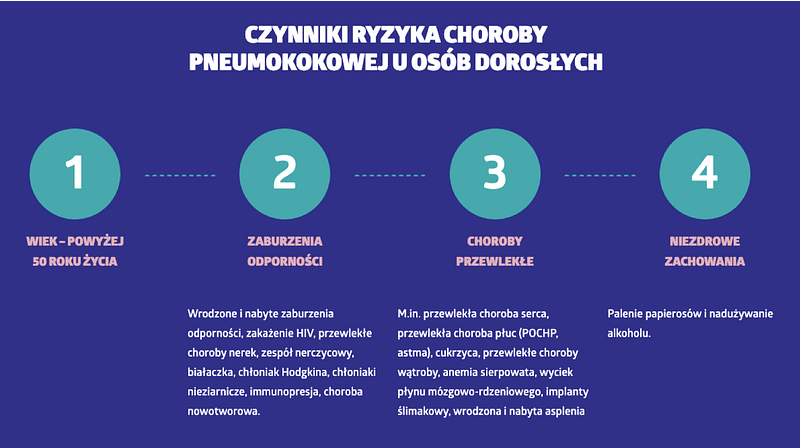The educational campaign Pneumococcus don't count the years. Vaccinated-Protected is intended to raise awareness of dangerous pneumococcal infections and the role of vaccination among adults particularly exposed to the dangers of Streptococcus Pneumoniae infection. The campaign includes educational and outreach activities on adult vaccination, particularly the prevention of dangerous pneumococcal infections. An educational website is also available www.PneumokokoweZapaleniePluc.pl, on which a compendium of knowledge on pneumococcus and its risks, advice on management and useful information for people at risk is available.
Respiratory diseases, including pneumonia, cause around one million deaths in Europe each year. The disease is very dangerous especially for the elderly and those with chronic illnesses, and one of the most common causes of pneumonia is bacterial infections caused by pneumococci, among others. World Pneumonia Day is celebrated on 12 November to draw attention to this forgotten and underestimated disease. This is especially important during the coronavirus pandemic, when we should prevent pneumonia even more than usual.
People over 65 years of age and chronically ill adults with co-morbid health problems and young children are most commonly affected by pneumonia. Lung diseases, especially COPD, heart disease, liver disease, kidney disease, nephrotic syndrome, diabetes mellitus, cancer and all immunocompromised conditions regardless of their cause, favour the development and severity of the disease.
Pneumococcal pneumonia. The bacteria that most commonly cause pneumonia in adults are pneumococci. In older adults and in adults with chronic diseases and immune disorders, they can lead to hospitalisation, exacerbation of concomitant diseases and, in some cases, death. Pneumonia accounts for approximately 50% of hospitalisations for respiratory diseases in adults in Poland.[2] In 2019, nearly 60 000 adults were hospitalised for pneumonia. When contracting pneumococcal pneumonia, 1 in 20 people may die, but the rate may be higher among older people. It is estimated that in 2013. 1 in 5 deaths among adults due to lower respiratory tract infections was related to pneumococcal pneumonia.
Pneumonia and coronavirus. Even before the pandemic, pneumonia cases in seniors and adults with chronic diseases and immune disorders often led to hospitalisation and exacerbation of concomitant diseases and even death. In addition, during a pandemic, the risk of hospitalisation should be minimised due to the risk of COVID-19 infection. Flu symptoms often resemble those of COVID-19, which may expose the patient to unnecessary contact with a facility for COVID-19-infected patients. Viral infection may open the way for bacteria and contribute to the development of pneumonia, for example. The elderly, who in addition have chronic illnesses, are always at the highest risk of such a complication. Recent/existing studies indicate that pneumococci can cause co-infection in COVID-19.
Treatment of pneumococcal pneumonia. Pneumococcal pneumonia is treated with antibiotics. However, treatment is also not facilitated by the fact that pneumococcal bacteria are resistant to antibiotics and infections caused by them simply heal poorly.
How to protect yourself against pneumococcal pneumonia? Not everyone is at the same risk of pnemococcal infection including pneumococcal pneumonia. Factors that increase the risk of pneumococcal disease in adults can be divided into four categories:

People with influenza are also at risk of pneumococcal infection. Streptococcus pneumoniae is one of the most common pathogens detected in patients hospitalised for influenza.[9] Severe influenza can favour the development of pneumococcal pneumonia. Up to 35% cases of hospitalisation due to influenza lead to concomitant bacterial infection with S. pneumoniae. Meanwhile, post-influenza bacterial pneumonia is a major cause of morbidity and mortality during an influenza epidemic/pandemic.[10] As with children, vaccination is the recommended form of prevention of infection with the dangerous bacterium. For adults, effective vaccinations are available to protect against Invasive Pneumococcal Disease and pneumococcal pneumonia. The older type polysaccharide vaccine requires repeated inoculations, the conjugated vaccine requires only one administration. It is worth mentioning that the pneumococcal vaccine can be administered together with the influenza vaccine.
The campaign is organised by the Institute for Patient Rights and Health Education and Pfizer.
Honorary Patronage: General Sanitary Inspectorate (GIS)
Content partners: Polish Society of Clinical Oncology, Polish Society of Oncology, Polish Society of Haematologists and Transfusiologists, Polish Society of Family Medicine, Polish Lung Cancer Group. Campaign partners: "Onkocafe - Together Better" Foundation, "Aby żyć" Foundation, CARITA Foundation, Polish Association of Diabetics (PSD), Polish Federation of Associations of Asthma, Allergy and COPD Patients, Polish Multiple Sclerosis Society (PTSR), Polish Association of Patients with Heart and Vascular Diseases "ECOSERCE", Association of Amazons - Centrum, SANITAS Association, SED Education and Diabetology Association, NADZIEJA Oncology Foundation, Sercoma. Association for Helping Sick People with Sarcomas, Podwale Seven Association, Living with Cancer Oncology Foundation.
Media partners: Journalist Club for Health Promotion and Mojacukrzyca.org

